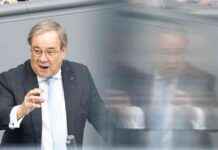Lindner warns of Union division by Merz: Merkel and AfD Criticized
In a recent exclusive interview, FDP leader Christian Lindner waded into the ongoing debate surrounding the Union’s approach in the Bundestag, following in the footsteps of former Chancellor Merkel. Lindner expressed his disapproval of Friedrich Merz seeking assistance from the AfD, labeling it as misguided. However, he also directed critical remarks towards Merkel, highlighting a growing divide within the Union.
Lindner, known for his charismatic presence and sharp political acumen, voiced concerns about CDU leader Friedrich Merz’s strategy in the migration debate, deeming it tactically unsound. He emphasized the precarious position in which the Union now finds itself, following Angela Merkel’s intervention. “I would not have advised Friedrich Merz to engage in this maneuver, as it allows the Red-Green coalition to divert attention from their own shortcomings,” Lindner shared candidly in an interview with our publication.
Maintaining a firm stance on the matter, Lindner reiterated the FDP’s unwavering stance against collaborating with the AfD. “While we could not base our support for a Union proposal on the voting behavior of other factions, a partnership with the AfD remains a taboo for the FDP,” Lindner asserted. Drawing attention to Merkel’s recent statements, Lindner underscored the divisive impact of Merz’s actions within the Union. He also pointed out the irony in Merkel’s position, attributing a significant portion of the AfD’s rise to her refugee policies.
Merkel herself did not mince words in her personal statement, sharply criticizing Merz for aligning with the AfD to pass the Union’s proposals on migration policy. Her public disavowal of the CDU chief’s decision further underscored the deep-seated rift within the Union, necessitating a reevaluation of internal dynamics and political strategies.
Expert Analysis: The Impact of Union Division on German Politics
As political tensions continue to escalate within the Union, experts are closely monitoring the repercussions of this internal strife on German politics as a whole. Dr. Anna Müller, a political analyst at the University of Berlin, sheds light on the broader implications of the rift between Merkel, Merz, and Lindner. “The fracturing of the Union could not only weaken the conservative bloc but also create opportunities for opposition parties to capitalize on this disarray,” Dr. Müller explains.
She further emphasizes the need for cohesive leadership within the Union to navigate complex policy issues effectively. “In a time of heightened political polarization, unity within the Union is crucial to maintaining stability and fostering constructive dialogue,” Dr. Müller adds. As Germany gears up for the upcoming Bundestag elections, the internal divisions within the Union are poised to have far-reaching consequences on the political landscape and public perception.
In Conclusion
As the political landscape in Germany undergoes a period of intense upheaval, the rift within the Union between Merkel, Merz, and Lindner serves as a stark reminder of the challenges facing the country’s leadership. While differing opinions and strategic maneuvers are inherent to any democratic system, the need for unity and coherence within political parties cannot be understated. The coming weeks and months will undoubtedly shed further light on the implications of this internal discord on the Union’s future and Germany’s political trajectory as a whole.















